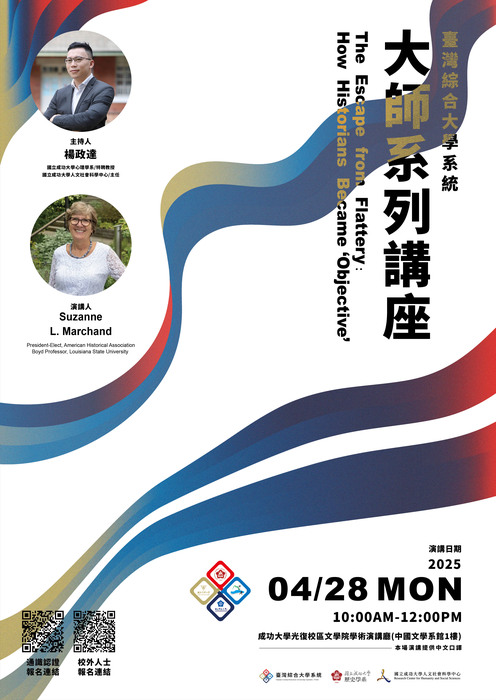【演講資訊】臺灣綜合大學系統 大師系列講座 Suzanne Marchand教授演講 | 114/4/28 (一)10:00~12:00
臺灣綜合大學系統 大師系列講座 Suzanne Marchand教授演講
演講名稱:臺灣綜合大學系統大師系列講座
主題:The Escape from Flattery:How Historians Became ‘Objective’(擺脫奉承:歷史家如何變得「客觀」)
日期/時間:2025年4月28日(一)10:00~12:00
地點:成功大學光復校區文學院學術演講廳(中國文學系館1樓)
講者:Suzanne Marchand
President-Elect, American Historical Association
Boyd Professor, Louisiana State University
主持人:楊政達
國立成功大學心理學系/特聘教授
國立成功大學人文社會科學中心/主任
主辦單位:臺灣綜合大學系統、國立成功大學歷史學系、
▓本場次講座將線上同步直播,Webex連結 (點選連結後,選取從此瀏覽器加入,請輸入姓名及電子郵件地址,並點擊加入meeting)
#本場演講提供中文口譯
摘要:
In the sixteenth and seventeenth century, it was totally normal for histories to be written on commission, to inform, educate, and flatter patrons, who were often princes. Tales were spun that cast a monarch in a favorable light, and/or cast his or her enemies as devious and incompetent rulers. Histories were also written as educational manuals for princes in waiting, to teach them Christian practices and to warn them against bad behavior by giving them distant historical examples, such as the barbarian behavior of King Herod or the Emperor Nero. A great deal of early modern history writing was written by courtiers, or paid hacks, and meant to please a noble or clerical patron. Such texts were so slanted that thinkers such as Descartes completely despaired of learning anything secure from history. The escape from flattery was really only possible with the collapsing of the system of personal patronage, and the movement of historians out of the court and to the academies or universities, where the incentive to flatter individual leaders was much reduced. The advent of de-personalized institutions did not make historians entirely objective; but it did mean that their livelihoods now depended much less on the subjective needs, ambitions, and vanities of a single man.

